大学英语第一单元
大学英语一第一单元知识全梳理
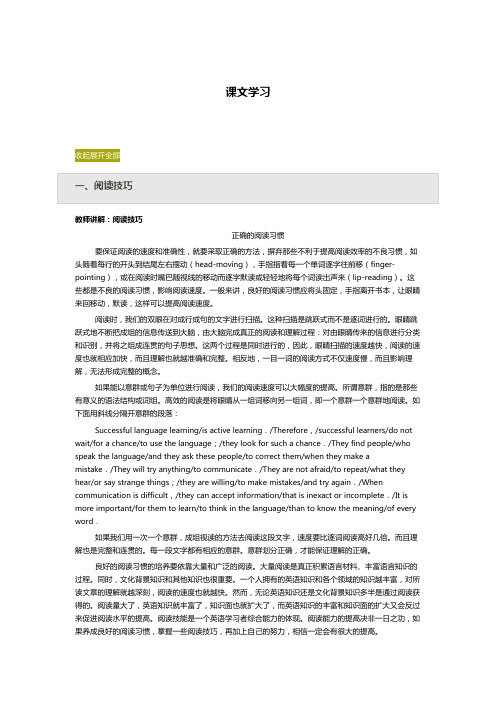
课文学习教师讲解:阅读技巧正确的阅读习惯要保证阅读的速度和准确性,就要采取正确的方法,摒弃那些不利于提高阅读效率的不良习惯,如头随着每行的开头到结尾左右摆动(head-moving),手指指着每一个单词逐字往前移(finger-pointing),或在阅读时嘴巴随视线的移动而逐字默读或轻轻地将每个词读出声来(lip-reading)。
这些都是不良的阅读习惯,影响阅读速度。
一般来讲,良好的阅读习惯应将头固定,手指离开书本,让眼睛来回移动,默读,这样可以提高阅读速度。
阅读时,我们的双眼在对成行成句的文字进行扫描。
这种扫描是跳跃式而不是逐词进行的。
眼睛跳跃式地不断把成组的信息传送到大脑,由大脑完成真正的阅读和理解过程:对由眼睛传来的信息进行分类和识别,并将之组成连贯的句子思想。
这两个过程是同时进行的,因此,眼睛扫描的速度越快,阅读的速度也就相应加快,而且理解也就越准确和完整。
相反地,一目一词的阅读方式不仅速度慢,而且影响理解,无法形成完整的概念。
如果能以意群或句子为单位进行阅读,我们的阅读速度可以大幅度的提高。
所谓意群,指的是那些有意义的语法结构或词组。
高效的阅读是将眼睛从一组词移向另一组词,即一个意群一个意群地阅读。
如下面用斜线分隔开意群的段落:Successful language learning/is active learning./Therefore,/successful learners/do not wait/for a chance/to use the language;/they look for such a chance./They find people/who speak the language/and they ask these people/to correct them/when they make a mistake./They will try anything/to communicate./They are not afraid/to repeat/what they hear/or say strange things;/they are willing/to make mistakes/and try again./When communication is difficult,/they can accept information/that is inexact or incomplete./It is more important/for them to learn/to think in the language/than to know the meaning/of every word.如果我们用一次一个意群,成组视读的方法去阅读这段文字,速度要比逐词阅读高好几倍。
大学英语第一单元试题与答案
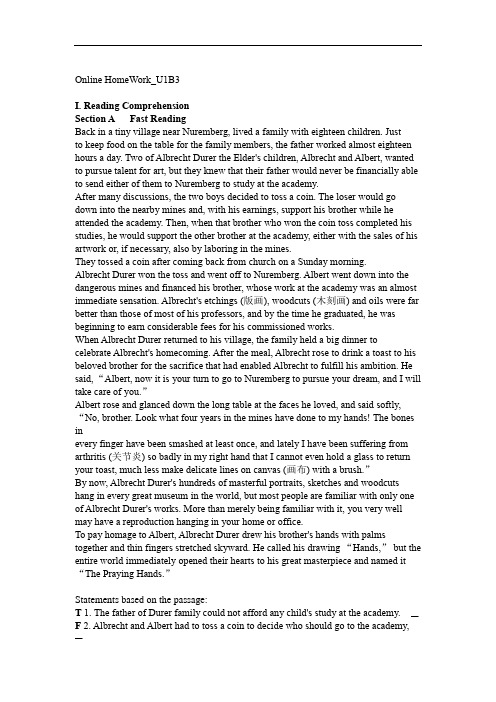
Online HomeWork_U1B3I. Reading ComprehensionSection A Fast ReadingBack in a tiny village near Nuremberg, lived a family with eighteen children. Justto keep food on the table for the family members, the father worked almost eighteen hours a day. Two of Albrecht Durer the Elder's children, Albrecht and Albert, wanted to pursue talent for art, but they knew that their father would never be financially able to send either of them to Nuremberg to study at the academy.After many discussions, the two boys decided to toss a coin. The loser would go down into the nearby mines and, with his earnings, support his brother while he attended the academy. Then, when that brother who won the coin toss completed his studies, he would support the other brother at the academy, either with the sales of his artwork or, if necessary, also by laboring in the mines.They tossed a coin after coming back from church on a Sunday morning.Albrecht Durer won the toss and went off to Nuremberg. Albert went down into the dangerous mines and financed his brother, whose work at the academy was an almost immediate sensation. Albrecht's etchings (版画), woodcuts (木刻画) and oils were far better than those of most of his professors, and by the time he graduated, he was beginning to earn considerable fees for his commissioned works.When Albrecht Durer returned to his village, the family held a big dinner to celebrate Albrecht's homecoming. After the meal, Albrecht rose to drink a toast to his beloved brother for the sacrifice that had enabled Albrecht to fulfill his ambition. He said, “Albert, now it is your turn to go to Nuremberg to pursue your dream, and I will take care of you.”Albert rose and glanced down the long table at the faces he loved, and said softly, “No, brother. Look what four years in the mines have done to my hands! The bones inevery finger have been smashed at least once, and lately I have been suffering from arthritis (关节炎) so badly in my right hand that I cannot even hold a glass to return your toast, much less make delicate lines on canvas (画布) with a brush.”By now, Albrecht Durer's hundreds of masterful portraits, sketches and woodcuts hang in every great museum in the world, but most people are familiar with only one of Albrecht Durer's works. More than merely being familiar with it, you very well may have a reproduction hanging in your home or office.To pay homage to Albert, Albrecht Durer drew his brother's hands with palms together and thin fingers stretched skyward. He called his drawing “Hands,”but the entire world immediately opened their hearts to his great masterpiece and named it “The Praying Hands.”Statements based on the passage:T 1. The father of Durer family could not afford any child's study at the academy.F 2. Albrecht and Albert had to toss a coin to decide who should go to the academy,because one of them had to stay at home and help their father.F 3. Before deciding to toss a coin, Albrecht and Albert had many discussions with1 / 10their father.T 4. Albrecht achieved great success at the academy, and his works were even better than most of his professors'.F 5. Albrecht decided to support Albert's study at the academy with the sales of his artwork and by laboring in the mines.F 6. Albert said it was too late for him to go to the academy because he was no longer interested in art after working in the mines for many years.F 7. Although Albrecht had many masterful portraits, only one of them has received popular recognition.T 8. Among Albrecht's works, “Hands”is the one which is reproduced most.T 9. Albrecht created “Hands”in order to show respect and honor for his brother Albert.F 10. People renamed Albrecht's drawing “The Praying Hands”because they just wanted to pay homage to his great achievement.Section B Passage ReadingPassage 1Valentine's Day probably has its origin in the ancient Roman celebration called Lupercalia(牧神节). It was celebrated on February 15. In the Roman calendar February was in the spring. The celebration honored the gods Lupercus and Faunus as well as the twin brothers Romulus and Remus, the legendary founders of Rome. As part of the ceremony the priests paired up young men and women. The girls' names were placed in a box and each boy drew a girl's name. The couple was paired then until the next Lupercalia.In 260 AD the emperor Claudius II, called Claudius the Cruel, decided that young soldiers would only be distracted by marriage and so ordered that young men may not marry. Valentinus (Valentine), a Christian priest, defied the emperor and got married in secret. He was caught and executed on February 14, the eve of Lupercalia. His name became associated with young love forever after. In 496, Pope Gelasius set aside February 14 to honor him as Saint Valentine and it has been St. Valentine's Day ever since.In the Middle Ages some of the customs of the Lupercalia still persisted in spiteof the attempts of the Church to put an end to these non-Christian customs and Christianize the holiday. Both men and women drew names from a bowl to see who their valentines would be. They would wear the names on their sleeves for a week. Today we still sometimes “wear our hearts on our sleeves”when we cannot concealour feelings.In the 1600s, it became common to give flowers, particularly the rose, as a sign of love as the “language of flowers”. This came to Europe from Turkey. The color and placement of the rose held a special significance--a red rose, for example, meant beauty. Flowers have been part of Valentine's Day ever since.D 11. What does the passage mainly tell us?A. The custom of Valentine's Day.2 / 10B. A story about how Valentinus defied the emperor.C. The relationship between marriage and religion.D. The origin of Valentine's Day.B 12. Young soldiers were not allowed to marry because the emperor was afraid that ______.A. they would associate with St. ValentineB. they wouldn't concentrate on their jobC. they would defy the emperor's orderD. they were too young to marryC 13. What does the word “defied”(underlined in Paragraph 2) probably mean?A. Followed.B. Tried to cheat.C. Refused to obey.D. Condemned.B 14. The day February 14 has been St. Valentine's day since ______.A. 260 ADB. 496 ADC. the founding of RomeD. the Middle AgesB 15. According to Paragraph 3, what does the phrase “wear our hearts on our sleeves”mean?A. To hide our true feelings.B. To show our true feelings openly.C. To demonstrate our love.D. To keep our feelings in our mind.Passage 2In Africa and Asia there is a very serious disease called schistosomiasis (血吸虫病). It is caused by a tiny worm which can penetrate the skin of a human being andcause a potentially serious illness. The larvae (幼虫) of these worms live in certaintypes of snails. When they are ready, the larvae leave the snails and enter the bodies of men and animals.In many African rivers there is a large animal called a hippopotamus. It looksrather like an enormous sausage with short legs and a big mouth. Hippos spend much of their time in the river and they do not seem to serve any purpose. Because of this, some African governments ordered that the great animals should be shot on sight to provide meat for local people. When hunters killed most of the hippos in some areas, the number of cases of the disease increased rapidly. There were outbreaks of the disease in areas which had not previously experienced it. At first, the health authorities could not understand the reason why the disease had spread. They made3 / 10investigations and discovered some very surprising facts.When they are in the water, hippos keep the muddy water in motion because they move about frequently. When they climb up on the river bank, they go in single file, making natural channels down which rain water can flow into the river. Without the hippos, mud gathered in the rivers and caused them to run over their banks. At the same time, rain water was unable to drain into the rivers easily, and this helped to produce floods. Certain types of water snail breed rapidly on flooded land, carrying with them the larvae which spread schistosomiasis.Now African governments are importing hippos so that Nature can do her work properly and keep the water snails under control. This is one example of what happens when Man interferes with the work of Nature.A 16. We know that a potentially serious illness is caused when ______.A. the skin of a human being is penetrated by a tiny wormB. the larvae of snails enter the bodies of human beingsC. human beings keep pet snailsD. human beings eat too much meat of hipposD 17. Why were hippos shot to death in Africa?A. Because they look like sausages with short legs and big mouth.B. Because some governments wanted to provide meat for local people.C. Because there were too many hippos in the river.D. Because they were considered useless.A 18. Why did schistosomiasis spread in some areas in Africa?A. Because many hippos were killed.B. Because there were too many channels in the river.C. Because the number of the larvae was increased.D. Because the water snails were kept under control.D 19. According to the passage, which of the following is true about African governments?A. They didn't build enough channels to drain the floods.B. They couldn't find out the connection between hippos and the spread of schistosomiasis.C. They are trying to kill water snails which carry the larvae with schistosomiasis.D. They are trying to control the spread of schistosomiasis in an eco-friendly way.C 20. Nature cannot do her work in a satisfactory way if ______.A. too many hippos are killedB. governments interfere with local peopleC. man interferes with the work of natureD. a disease spreads4 / 10Section C Reading in DepthIn the 1990s, everyone believed that education was the key to economic success.A college degree, even a postgraduate degree, was G for everyone who wanted a goodjob as one of those “symbolic analysts”.But computers are proficient at analyzing symbols。
大学英语教材第一单元课文
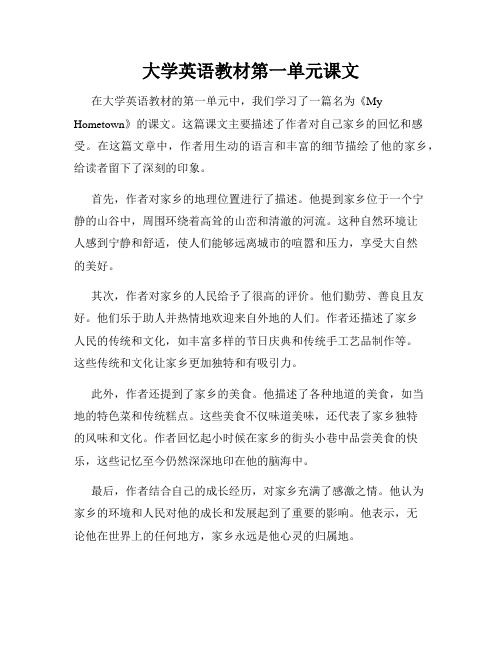
大学英语教材第一单元课文在大学英语教材的第一单元中,我们学习了一篇名为《My Hometown》的课文。
这篇课文主要描述了作者对自己家乡的回忆和感受。
在这篇文章中,作者用生动的语言和丰富的细节描绘了他的家乡,给读者留下了深刻的印象。
首先,作者对家乡的地理位置进行了描述。
他提到家乡位于一个宁静的山谷中,周围环绕着高耸的山峦和清澈的河流。
这种自然环境让人感到宁静和舒适,使人们能够远离城市的喧嚣和压力,享受大自然的美好。
其次,作者对家乡的人民给予了很高的评价。
他们勤劳、善良且友好。
他们乐于助人并热情地欢迎来自外地的人们。
作者还描述了家乡人民的传统和文化,如丰富多样的节日庆典和传统手工艺品制作等。
这些传统和文化让家乡更加独特和有吸引力。
此外,作者还提到了家乡的美食。
他描述了各种地道的美食,如当地的特色菜和传统糕点。
这些美食不仅味道美味,还代表了家乡独特的风味和文化。
作者回忆起小时候在家乡的街头小巷中品尝美食的快乐,这些记忆至今仍然深深地印在他的脑海中。
最后,作者结合自己的成长经历,对家乡充满了感激之情。
他认为家乡的环境和人民对他的成长和发展起到了重要的影响。
他表示,无论他在世界上的任何地方,家乡永远是他心灵的归属地。
通过这篇《My Hometown》的课文,我们不仅了解了作者对家乡的深入描述,还能感受到他对家乡的心灵纽带。
这样的文章不仅帮助我们提高英语阅读能力,还激发了我们对家乡的思考和回忆。
它让我们更加珍惜家乡的一切,并在远离家乡时感到亲切和温暖。
总结起来,大学英语教材第一单元的课文《My Hometown》通过详细描绘作者的家乡,展现了家乡的独特之处和对作者成长的影响。
这样的课文不仅在语言表达上有所帮助,还引发了我们对家乡的情感共鸣。
通过阅读和理解这篇课文,我们可以更好地了解和欣赏我们自己的家乡。
大学英语一第一单元知识全梳理.doc
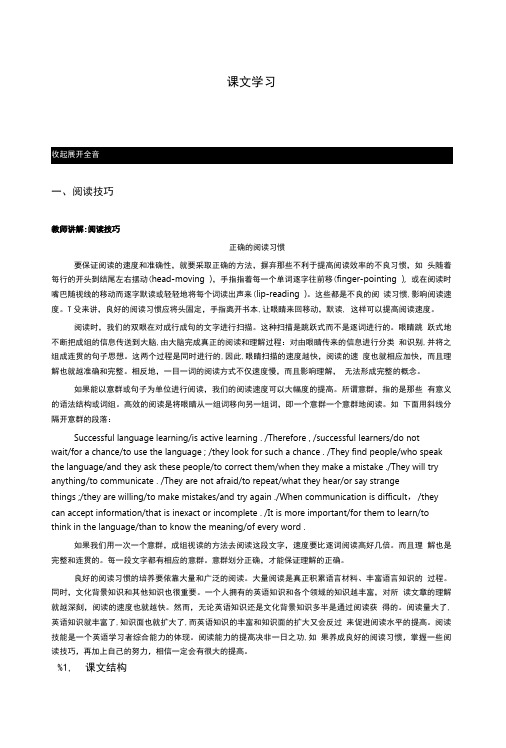
课文学习一、阅读技巧教师讲解:阅读技巧正确的阅读习惯要保证阅读的速度和准确性,就要采取正确的方法,摒弃那些不利于提高阅读效率的不良习惯,如头随着每行的开头到结尾左右摆动(head-moving ),手指指着每一个单词逐字往前移(finger-pointing ), 或在阅读时嘴巴随视线的移动而逐字默读或轻轻地将每个词读出声来(lip-reading )。
这些都是不良的阅读习惯,影响阅读速度。
T殳来讲,良好的阅读习惯应将头固定,手指离开书本,让眼睛来回移动,默读, 这样可以提高阅读速度。
阅读时,我们的双眼在对成行成句的文字进行扫描。
这种扫描是跳跃式而不是逐词进行的。
眼睛跳跃式地不断把成组的信息传送到大脑,由大脑完成真正的阅读和理解过程:对由眼睛传来的信息进行分类和识别,并将之组成连贯的句子思想。
这两个过程是同时进行的,因此,眼睛扫描的速度越快,阅读的速度也就相应加快,而且理解也就越准确和完整。
相反地,一目一词的阅读方式不仅速度慢,而且影响理解,无法形成完整的概念。
如果能以意群或句子为单位进行阅读,我们的阅读速度可以大幅度的提高。
所谓意群,指的是那些有意义的语法结构或词组。
高效的阅读是将眼睛从一组词移向另一组词,即一个意群一个意群地阅读。
如下面用斜线分隔开意群的段落:Successful language learning/is active learning . /Therefore , /successful learners/do notwait/for a chance/to use the language ; /they look for such a chance . /They find people/who speak the language/and they ask these people/to correct them/when they make a mistake ./They will try anything/to communicate . /They are not afraid/to repeat/what they hear/or say strangethings ;/they are willing/to make mistakes/and try again ./When communication is difficult,/they can accept information/that is inexact or incomplete . /It is more important/for them to learn/to think in the language/than to know the meaning/of every word .如果我们用一次一个意群,成组视读的方法去阅读这段文字,速度要比逐词阅读高好几倍。
新标准大学英语1答案
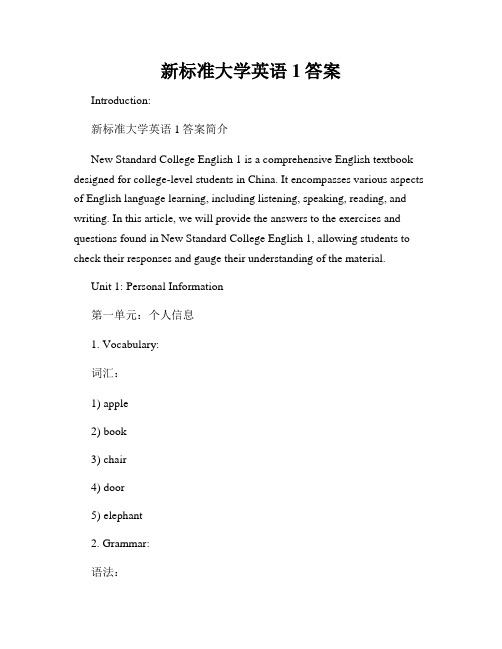
新标准大学英语1答案Introduction:新标准大学英语1答案简介New Standard College English 1 is a comprehensive English textbook designed for college-level students in China. It encompasses various aspects of English language learning, including listening, speaking, reading, and writing. In this article, we will provide the answers to the exercises and questions found in New Standard College English 1, allowing students to check their responses and gauge their understanding of the material.Unit 1: Personal Information第一单元:个人信息1. Vocabulary:词汇:1) apple2) book3) chair4) door5) elephant2. Grammar:语法:1) He is a student.2) She is my sister.3) They are teachers.4) We are friends.5) I am an engineer.3. Listening:听力:1) B2) A3) C4) B5) CUnit 2: Daily Life第二单元:日常生活1. Vocabulary:词汇:1) breakfast2) lunch3) dinner5) vegetables2. Grammar:语法:1) I wake up at 7:00 am every day.2) She brushes her teeth before going to bed.3) They have lunch at 12:30 pm.4) We go to the gym in the evening.5) He reads a book before sleeping.3. Listening:听力:1) C2) B3) A4) A5) BUnit 3: Leisure Activities第三单元:休闲活动1. Vocabulary:1) swimming2) dancing3) painting4) hiking5) cooking2. Grammar:语法:1) She enjoys swimming in the pool.2) They like dancing at parties.3) He loves painting landscapes.4) We go hiking in the mountains.5) I enjoy cooking Italian cuisine. 3. Listening:听力:1) B2) C3) A4) BUnit 4: Travel第四单元:旅行1. Vocabulary:词汇:1) airplane2) hotel3) passport4) suitcase5) destination2. Grammar:语法:1) I am going to Europe next month.2) She will stay at a five-star hotel.3) They have their passports ready.4) We need to pack our suitcases.5) He is excited to explore a new destination.3. Listening:听力:2) A3) B4) B5) AConclusion:结论This article has provided the answers to exercises and questions found in the first four units of New Standard College English 1. By referring to this article, students can check their responses and assess their progress in learning English. Remember to practice regularly and utilize the accompanying materials provided by the textbook to further enhance your language skills. Good luck with your English language learning journey!。
大学英语第一单元

大学英语第一单元第一部分:英语学习的重要性英语是一门全球通用的语言,在各个领域都扮演着重要的角色。
学好英语不仅可以拓宽我们的交流范围,还可以提升我们的就业竞争力。
然而,对于大学生来说,英语学习可能面临一些挑战,因此我们需要认识到英语学习的重要性,以及如何有效地学习英语。
第二部分:有效学习英语的方法1. 听力训练听力是英语学习的基础,通过听力训练可以提高我们的听力理解能力。
我们可以使用各种资源,如英语电影、英语歌曲和英语广播节目来进行听力训练。
此外,使用英语学习网站和应用程序也是一个不错的选择。
2.口语练习口语是英语学习中最常被忽视的方面之一。
通过积极参与口语练习,我们可以提高自己的口语表达能力,增强自信心。
我们可以找一个英语学习伙伴进行对话练习,或者参加语言交流活动。
3.阅读技巧阅读是扩大词汇量和提高语言理解能力的有效方法。
我们可以选择自己感兴趣的英文小说、文章和新闻来进行阅读。
在阅读过程中,我们应该注重理解文章的主旨,掌握上下文的语境以及生词的意义。
4.写作练习写作是培养语言组织能力和提高语法水平的重要手段。
我们可以通过写日记、写文章和参加写作比赛等方式进行写作练习。
此外,可以请教老师或者同学对我们的作文进行修改和改进。
第三部分:应对英语学习挑战的技巧1.坚持学习英语学习并不是一蹴而就的过程,需要长期坚持。
我们可以制定学习计划,每天安排一定的学习时间,并且保持学习的兴趣和动力。
2.积极参与课堂课堂是我们学习英语最重要的场所之一。
在课堂上,我们要积极参与讨论,主动回答问题,与老师和同学进行互动交流,提高自己的口语表达能力和理解能力。
3.利用多种学习资源现代科技为我们提供了丰富的学习资源。
我们可以使用各种英语学习软件、网站、应用程序来辅助学习。
此外,还可以参加英语角、英语俱乐部等活动,与他人进行语言交流。
4.养成良好的学习习惯良好的学习习惯对于英语学习至关重要。
我们要保持规律的学习时间和学习环境,制定合理的学习计划,并且要有耐心和恒心。
新标准大学英语第一单元,课文翻译,短语,答案
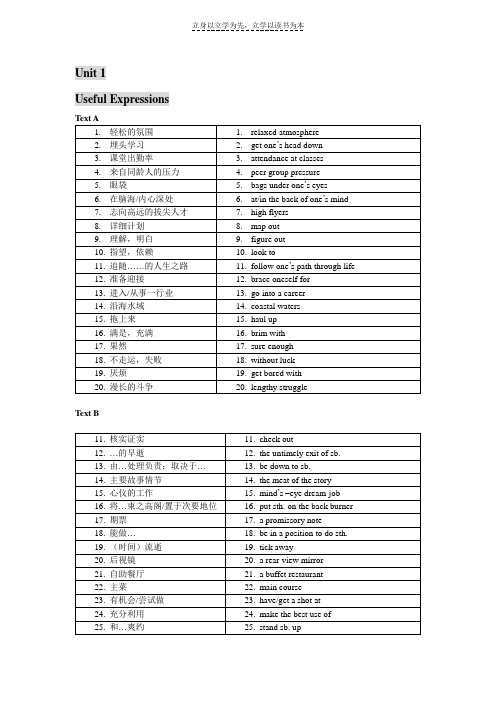
Unit 1Useful ExpressionsText BKeys to ExercisesText A3. 34. b, c, c, d, c, a5. productive, attendance, resistance, ambitious, acceptance, script, impressive6. attendance, ambitious, productive, impressive, resistance, script, acceptance7. mortgage, deck, surf, coastal, defy, lengthy8. b, a, b, b, a, a, b, bText B2. c, d, b3. 34. triple, cemetery, rear, biography, cram, budding, finite, elapse5. elapsed, cemetery, rear, crammed, triple, budding, biography, finite6. a, b, a, a, b, b, a, a7. a, b, b, a, a, b, b, b, aLanguage in use1. • I’ve double- and triple-checked it. (compound verb)• budding crypt-kickers (compound noun)• a rear-view mirror (compound adjective)• the once-a-year holiday to Florida or Spain (compound adjective)• back-burner stuff (compound adjective)• standing at the corner of the Co-op (compound noun)• a sepia-coloured relative that no one can put a name to (compound adjective)2. a late-night party, a well-stocked library, a world-famous professor, some well-timedadvice, a rapidly-growing population, a free-market economy, a half-hour boat trip3. It’s how we behave that determines what other people think of us.It’s what our character is that usually determines what sort of job we are going to end up doing. It isn’t always what ma rks we get at university that determines what we do as a career.It is often what we experienced in our childhood that determines how we react to life’s problems.It’s what our genetic clock is and what changes we make to it that determine when we die.4. It wasn’t just that the shops were all closed for Thanksgiving, but there was no one in thestreets.It wasn’t just that she spent all her time at college going to pa rties, but she took the time togaina first class degree.It wasn’t just that they weren’t listening to what he said, but it seemed as if they weren’t at all interested.It wasn’t just that I was upset, but I felt as if I was going to burst out crying.It wasn’t just that the Grim Reaper was intended to frighten people, but it was also a figure of fun.6. 我们都觉得在校时间不多了,以后再也不会有这样的学习机会了,所以都下定决心不再虚度光阴。
大学英语第一单元词汇详解

Unit 1 Roll over, Beethoven! pirate:[ 'paiərit ]n. 海盗,盗印者,侵犯专利权者v. 盗印,掠夺,翻印The design for the new dress collection is pirate in the far east.新式服装的系列设计在远东被非法剽窃。
encore:[ ɔŋ'kɔ: ]n. 再演唱的要求,经要求而再唱v. 要求再演或唱The violinist got an enthusiastic encore.听众热情要求小提琴手再演奏一曲.anorexia:[ .ænə'reksiə ]n. 厌食症The pop singer, Karen Carpenter, died of anorexia.starve:[ stɑ:v ]v. 使饿死,饿得要死The plant was starved of light and died.这株植物因为极度缺乏光照而死了。
harpsichord:[ 'hɑ:psikɔ:d ]n. 大键琴compose:[ kəm'pəuz ]v. 组成,写作,作曲Water is composed of hydrogen and oxygen.水由氢和氧组成。
He was composing at the piano at the age of seven.他7岁时就会钢琴作曲。
symphony:[ 'simfəni ]n. 交响乐The first movement of the symphony is beautiful.这部交响乐的第一乐章是很优美的。
conductor:[ kən'dʌktə ]n. 售票员,导体,(乐队的)指挥The conductor punched his bus ticket.售票员用剪票夹在他的汽车票上打孔。
大学英语一第一单元知识全梳理

课文学习教师讲解:阅读技巧正确的阅读习惯要保证阅读的速度和准确性,就要采取正确的方法,摒弃那些不利于提高阅读效率的不良习惯,如头随着每行的开头到结尾左右摆动(head-moving),手指指着每一个单词逐字往前移(finger-pointing),或在阅读时嘴巴随视线的移动而逐字默读或轻轻地将每个词读出声来(lip-reading)。
这些都是不良的阅读习惯,影响阅读速度。
一般来讲,良好的阅读习惯应将头固定,手指离开书本,让眼睛来回移动,默读,这样可以提高阅读速度。
阅读时,我们的双眼在对成行成句的文字进行扫描。
这种扫描是跳跃式而不是逐词进行的。
眼睛跳跃式地不断把成组的信息传送到大脑,由大脑完成真正的阅读和理解过程:对由眼睛传来的信息进行分类和识别,并将之组成连贯的句子思想。
这两个过程是同时进行的,因此,眼睛扫描的速度越快,阅读的速度也就相应加快,而且理解也就越准确和完整。
相反地,一目一词的阅读方式不仅速度慢,而且影响理解,无法形成完整的概念。
如果能以意群或句子为单位进行阅读,我们的阅读速度可以大幅度的提高。
所谓意群,指的是那些有意义的语法结构或词组。
高效的阅读是将眼睛从一组词移向另一组词,即一个意群一个意群地阅读。
如下面用斜线分隔开意群的段落:Successful language learning/is active learning./Therefore,/successful learners/do not wait/for a chance/to use the language;/they look for such a chance./They find people/who speak the language/and they ask these people/to correct them/when they make a mistake./They will try anything/to communicate./They are not afraid/to repeat/what they hear/or say strange things;/they are willing/to make mistakes/and try again./When communication is difficult,/they can accept information/that is inexact or incomplete./It is more important/for them to learn/to think in the language/than to know the meaning/of every word.如果我们用一次一个意群,成组视读的方法去阅读这段文字,速度要比逐词阅读高好几倍。
大学英语第一册第一单元单词
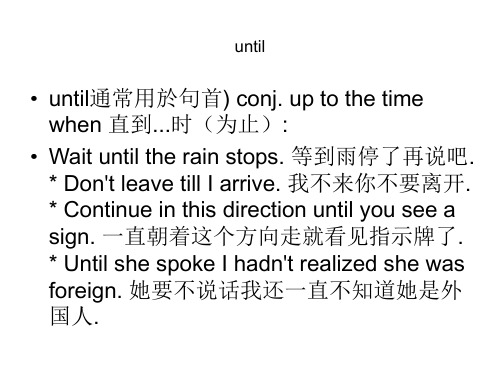
• prep 直到(某一时刻): • wait until tomorrow 等到明天 * • It may last till Friday. 这可能要延续到星期五. * • Nothing happened until (ie before) 5 o'clock. 五点钟以前
没有出现任何迹象.
CF: stern 与 severe 相近,但用途比较窄,一般用于人的 容貌或态度。例如:a stern father 和 a severe father 都可以用,但含义稍有不同:a severe father 指对于子女有严厉的要求,积极的意义较多;a stern father 则指对子女不含温情,要他们服从,消极的意 味较多。 strict 相当于汉语的 “严格的”,须先假定有一种客 观的标准(如规章、纪律、定义、真理等)。例如:
CF: severe, stern & strict
severe 作“严厉”解时,可以用来形容人(severe father 严厉的父亲),人的面貌(severe look 严厉 的神色),人的态度(The teacher is severe with his students. 教师对学生很严厉。)。
until
• until通常用於句首) conj. up to the time when 直到...时(为止):
• Wait until the rain stops. 等到雨停了再说吧. * Don't leave till I arrive. 我不来你不要离开. * Continue in this direction until you see a sign. 一直朝着这个方向走就看见指示牌了. * Until she spoke I hadn't realized she was foreign. 她要不说话我还一直不知道她是外 国人.
大学英语第一册单词第一单元
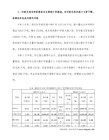
<31>communicate 交流;交际,传达;传播<32>favorite最喜欢的,特别喜爱的人或物<33>gap差距;分歧<34>at times有时,偶尔<35>be worth sth./doing sth.|值得...的<36>not only...but also...|||不仅...而且...<37>far from 一点都不<38>a couple of| 两个;一些,几个<39>get/have/obtain access to|有权享用;可以使用<40>participate in|参加<41>keep up with||赶上;不落后<42>feel like sth./doing sth. |想要;想做<43>give up停止,放弃<44>think out |仔细考虑;推敲;琢磨<45>come across|偶然遇到;偶然发现<46>reap the benefit(s) |获得益处,得到好处<47>trade for |用...换...<48>give sb. insight(s) into | 深刻理解<49>now that 既然,由于<50>instead of 而不是;代替<51>reach out to|接触,联系
大学英语专业精读教材第一单元课文内容与翻译
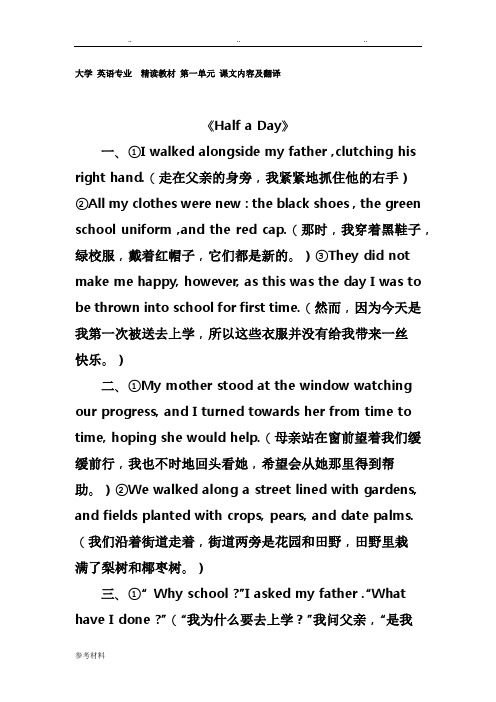
大学英语专业精读教材第一单元课文内容及翻译《Half a Day》一、①I walked alongside my father ,clutching his right hand.(走在父亲的身旁,我紧紧地抓住他的右手)②All my clothes were new : the black shoes , the green school uniform ,and the red cap.(那时,我穿着黑鞋子,绿校服,戴着红帽子,它们都是新的。
)③They did not make me happy, however, as this was the day I was to be thrown into school for first time.(然而,因为今天是我第一次被送去上学,所以这些衣服并没有给我带来一丝快乐。
)二、①My mother stood at the window watching our progress, and I turned towards her from time to time, hoping she would help.(母亲站在窗前望着我们缓缓前行,我也不时地回头看她,希望会从她那里得到帮助。
)②We walked along a street lined with gardens, and fields planted with crops, pears, and date palms.(我们沿着街道走着,街道两旁是花园和田野,田野里栽满了梨树和椰枣树。
)三、①“Why school ?”I asked my father .“What have I done ?”(“我为什么要去上学?”我问父亲,“是我做错了什么吗?”)四、①“I’m not punishing you,”he said ,laughing.“School’s not a punishment. It’s a place that makes useful men out of boys. Don’t you want to be useful like your brothers?”(“我不是在惩罚你,”父亲笑着说道,“上学不是一种惩罚。
大学英语 第一单元 Unit Hello, Hi!

Lu Yang: Welcome to our department, Mike.
Michael: Thank you. Here's my card.
Lu Yang: Thanks. So you are here for the research project?
Michael: Yes, I am.
Jack: Excuse me, are you Mr. Li Tiegang?
Li Tiegang: Yes, I am.
Jack: How do you do, Mr. Li? I'm Jack Green from Zhonghua Technical
School.
Li Tiegang: Nice to meet you, Mr. Green. Welcome to our company.
Jack: Thank you. Here is my business card.
Li Tiegang: Thanks. This is mine.
Unit | One
2) Meeting People Again Lu Yang: Hi, long time no see, Mike. Do you remember me? Michael: Oh, it's you, Professor Lu. How nice to see you again. How are you? Lu Yang: Very well, thank you. How is your project? Michael: It's going fine. I'm here to present the project report. Lu Yang: Good. I'm also here for the conference. Michael: Really? It's a small world.
大学大一英语教材第一单元单词
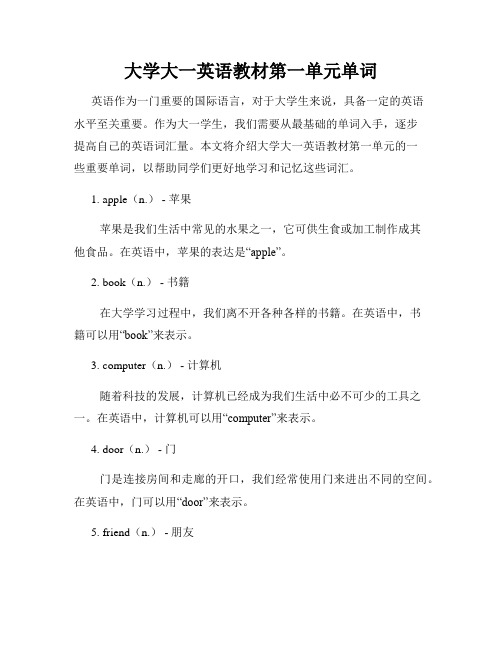
大学大一英语教材第一单元单词英语作为一门重要的国际语言,对于大学生来说,具备一定的英语水平至关重要。
作为大一学生,我们需要从最基础的单词入手,逐步提高自己的英语词汇量。
本文将介绍大学大一英语教材第一单元的一些重要单词,以帮助同学们更好地学习和记忆这些词汇。
1. apple(n.) - 苹果苹果是我们生活中常见的水果之一,它可供生食或加工制作成其他食品。
在英语中,苹果的表达是“apple”。
2. book(n.) - 书籍在大学学习过程中,我们离不开各种各样的书籍。
在英语中,书籍可以用“book”来表示。
3. computer(n.) - 计算机随着科技的发展,计算机已经成为我们生活中必不可少的工具之一。
在英语中,计算机可以用“computer”来表示。
4. door(n.) - 门门是连接房间和走廊的开口,我们经常使用门来进出不同的空间。
在英语中,门可以用“door”来表示。
5. friend(n.) - 朋友朋友在我们的生活中扮演着重要的角色,他们给予我们支持和帮助。
在英语中,朋友的表达是“friend”。
6. class(n.) - 班级大学中,学生们会被划分到不同的班级中进行学习和交流。
在英语中,班级可以用“class”来表示。
7. university(n.) - 大学大学是我们接受高等教育的地方,为我们的未来发展奠定基础。
在英语中,大学可以用“university”来表示。
8. listen(v.) - 听听是我们获取信息的一种方式,也是语言学习的重要环节。
在英语中,听可以用“listen”来表示。
9. speak(v.) - 说话说话是我们与他人交流沟通的方式,也是语言运用的核心要素。
在英语中,说话可以用“speak”来表示。
10. write(v.) - 写写是我们进行书面表达的行为,也是学习和工作中常见的任务。
在英语中,写可以用“write”来表示。
以上是大学大一英语教材第一单元中一些常见的单词。
大学英语教材第一单元总结

大学英语教材第一单元总结大学英语教材第一单元主要介绍了英语学习的重要性以及学习英语的一些基础知识和技巧。
通过学习这一单元的内容,我对英语学习有了更深入的理解,并且掌握了一些有效的学习方法。
以下是对本单元内容的总结。
首先,在学习英语之前,我们需要明确学习英语的目的和重要性。
英语作为一门全球通用的语言,在国际交流、学术研究、职业发展等方面都有着广泛的应用。
因此,学习英语对于提升自己的综合素养和拓宽自己的发展空间非常重要。
在学习英语的过程中,我们需要注重培养语言技能,包括听、说、读、写四个方面。
通过听力训练,我们可以提高自己的听力理解能力,培养对英语语音、语调的敏感度;通过口语训练,我们可以提高自己的口语表达能力,培养英语思维的习惯;通过阅读训练,我们可以提高自己的阅读理解能力,拓宽自己的词汇量和语法运用能力;通过写作训练,我们可以提高自己的写作能力,培养逻辑思维和表达能力。
在实际学习过程中,我们可以运用一些学习技巧来提高学习效果。
首先,我们可以通过大量的听力练习来提高自己的听力理解能力,可以选择一些英语电影、英语广播或者英语原版音乐来进行听力训练。
其次,我们可以通过模仿英语母语者的口音和语调来提高自己的口语表达能力。
可以选择一些有英文字幕或者中英双语字幕的影视作品进行模仿和学习。
此外,我们还可以通过大量的阅读来积累词汇和语法知识,可以选择一些英语原版的小说、报纸或者杂志来进行阅读训练。
最后,我们可以通过写作练习来提高自己的写作能力,可以选择一些写作题目或者模仿一些优秀的英语作文进行写作练习。
在英语学习的过程中,我们还需要注意词汇和语法的学习。
词汇是语言学习的基础,我们可以通过背诵单词、阅读文章、参加词汇测试等方式来扩充自己的词汇量。
同时,我们也需要学习和掌握一些基本的语法知识,以便正确地运用语言。
可以通过学习语法教材、做语法练习等方式来提高自己的语法水平。
总而言之,大学英语教材第一单元的内容涵盖了英语学习的重要性、语言技能的培养以及学习技巧的运用等方面。
大学英语第一单元测试题及答案

大学英语第一单元测试题及答案一、听力理解(共20分)1. 听对话,选择正确答案。
- 问题一:What is the man going to do tomorrow?A) Go to the library.B) Go to the cinema.C) Stay at home.答案:A- 问题二:What does the woman think of the weather?A) It's too cold.B) It's just right.C) It's too hot.答案:B2. 听短文,完成以下信息。
- 短文摘要:The passage talks about the importance of communication skills in the workplace.- 问题一:What is the main topic of the passage?答案:The importance of communication skills.- 问题二:Why are communication skills important?答案:They help to build relationships and resolve conflicts.二、词汇与语法(共30分)1. 选择填空。
- 例句:I have never been to Paris, but it is a place Iwould like to _______.A) visitB) visitsC) visiting答案:A2. 改错。
- 例句:She don't like to eat vegetables.答案:She doesn't like to eat vegetables.三、阅读理解(共30分)1. 阅读以下短文,回答后面的问题。
- 短文摘要:The text describes the benefits of learning a second language.- 问题一:What are the benefits of learning a second language mentioned in the text?答案:It can improve cognitive skills, enhance job opportunities, and promote cultural understanding.- 问题二:According to the text, what is the best age to start learning a second language?答案:The best age is during childhood.四、写作(共20分)1. 写一篇短文,描述你理想中的大学生活。
大学英语教材第一单元

大学英语教材第一单元大学英语教材的第一单元主要涵盖了英语的基础知识和学习方法。
本文将为大家介绍这个单元的内容,以及如何有效地学习英语。
第一部分:基础知识在大学英语教材的第一单元中,我们首先学习了英语的基本发音规则。
发音是学好英语的基础,掌握准确的发音能够帮助我们更好地理解和表达英语。
在学习发音时,我们需要注意不同音标的含义和发音方式,并进行反复练习。
除了发音,第一单元还包括了一些常用的语法知识。
例如,名词、动词和形容词的用法,以及基本的句子结构等。
这些基础知识是我们学习英语的基石,掌握好它们会让我们在后续的学习中受益匪浅。
第二部分:学习方法学习英语需要一套科学有效的方法。
在第一单元的学习中,我们了解到了一些学习英语的技巧和策略。
以下是一些建议:1. 多听多读多练习:英语是一门语言,学习语言就需要多听多读多练习。
通过大量的听力训练可以帮助我们熟悉英语的语音和节奏,提高我们的听力理解能力。
同时,读英语文章和书籍可以扩展我们的词汇量和阅读理解能力。
最后,在口语和写作方面,进行大量的练习是必不可少的。
2. 创造语言环境:英语不是我们的母语,要想熟练地运用它,我们需要营造一个英语学习的环境。
可以通过听英语歌曲、看英语电影、和外国朋友交流等方式,让英语融入到我们的日常生活中。
3. 制定学习计划:制定一个合理的学习计划可以帮助我们更加有条理地学习英语。
我们可以根据自己的时间和学习需求,安排每天的学习内容和学习时间,并且根据实际情况进行调整。
坚持执行学习计划可以让我们学习更加高效。
总结:大学英语教材的第一单元为我们打下了坚实的英语学习基础。
通过学习基础知识和掌握学习方法,我们将能够更好地进行后续的英语学习。
希望大家能够利用这个单元的内容,制定良好的学习计划,坚持学习,不断提升自己的英语水平。
以上就是大学英语教材第一单元的内容和学习方法的简单介绍。
希望这篇文章能够对大家的英语学习有所帮助。
祝大家学习进步,取得好成绩!。
大学英语1第一单元(课后练习答案)
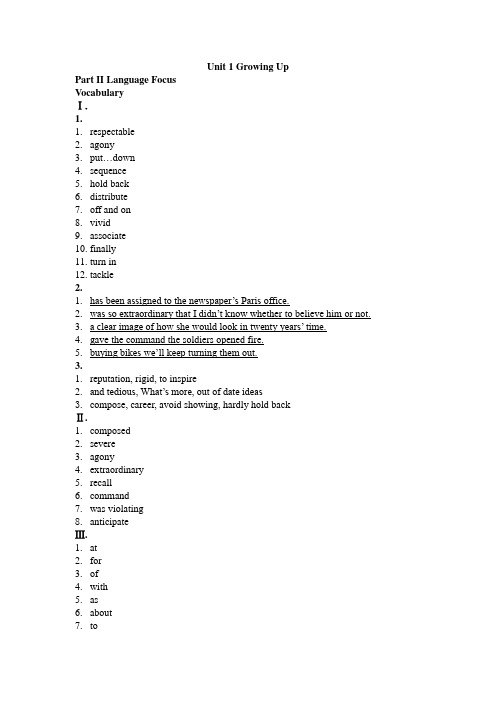
Unit 1 Growing UpPart II Language FocusVocabularyⅠ.1.1.respectable2.agony3.put…down4.sequence5.hold back6.distribute7.off and on8.vivid9.associate10.finally11.turn in12.tackle2.1.has been assigned to the newspaper’s Paris office.2.was so extraordinary that I didn’t k now whether to believe him or not.3. a clear image of how she would look in twenty years’ time.4.gave the command the soldiers opened fire.5.buying bikes we’ll keep turning them out.3.1.reputation, rigid, to inspire2.and tedious, What’s more, out of date ideaspose, career, avoid showing, hardly hold backⅡ.posed2.severe3.agony4.extraordinary5.recallmand7.was violating8.anticipateⅢ.1.at2.for3.of4.with5.as6.about7.to8.in, in9.from10.on/uponComprehensive ExercisesⅠ. Cloze1.1.hold back2.tedious3.scanned4.recall5.vivid6.off and on7.turn out/in8.career2.st2.surprise3.pulled4.blowing5.dressed6.scene7.extraordinary8.image9.turn10.excitementⅡ. Translation1.1.As it was a formal dinner party, I wore formal dress, as Mother told me to.2.His girlfriend advised him to get out of/get rid of his bad habit of smoking beforeit took hold.3.Anticipating that the demand for electricity will be high during the next fewmonths, they have decided to increase its production.4.It is said that Bill has been fired for continually violating the company’s safetyrules. /Bill is said to have been fired for continually violating the company’s safety rules.5.It is reported that the government has taken proper measures to avoid thepossibility of a severe water shortage. /The local government is reported to have taken proper measures to avoid the possibility of a severe water shortage.2.Susan lost her legs because of / in a car accident. For a time, she didn’t know how to face up to the fact that she would never (be able to) walk again.One day, while scanning (through) some magazines, a true story caught her eye /she was attracted by a true story. It gave a vivid description of how a disabled girlbecame a writer. Greatly inspired, Susan began to feel that she, too, would finally be bale to lead a useful life.。
- 1、下载文档前请自行甄别文档内容的完整性,平台不提供额外的编辑、内容补充、找答案等附加服务。
- 2、"仅部分预览"的文档,不可在线预览部分如存在完整性等问题,可反馈申请退款(可完整预览的文档不适用该条件!)。
- 3、如文档侵犯您的权益,请联系客服反馈,我们会尽快为您处理(人工客服工作时间:9:00-18:30)。
大学英语第一单元1. TranslateInto English1)给这个词下定义To define this word (This word can be defined as…)2) 反感这种对待To resent this treatment3) 使学生沮丧To frustrate/depress students4) 宣战To declare war5) 对结果进行评估To evaluate the result6) 履行义务To fulfill one’s obligation/to perform one’s duty7) 缩小差距To narrow the gap8) 扩大业务To expand business9) 陈述事实To present facts2. Fill in the blanks with the proper form of the appropriate word listed below.1) occurrence occur 2) had applied, applicants, pursuit, occurring3) involved, handled, handling, apply 4) observant, occurrence5) observation, observed, occur 6) handle, occurs7) observe, application 8) occurred, involvement9) observers, handled 10) observation3. Translate1). He is so devoted to his research that the idea that he will soon have to retire never occurs to him.2). Many people have observed that, without effective checks, we have a tendency to abuse our power.3). Some countries refuse to get involved in this dispute and they resent any foreign interference.4). The control of the sand storms involves a tremendous amount of work and money.5). You have to take into consideration the local conditions when you apply these technologies.6). All applicants will have to fill out this form and mail in an application fee of 50 dollars.7). Based on his careful observation of children’s behavior he came to the conclusion that learning is a natural pleasure.8). In a country of many nationalities, ethnic harmony requires very careful handling.9). The government is determined to punish all the corrupt officials involved.10). Cheating at exams does not occur very often. But when it does, the school takes a very tough position.5. Fill in the blanks with the most appropriate word.1)-5)CBCAC 6)-10) DABDA1 Lesson TwoHow Reading Changed My Life Vocabulary1 TranslateInto Chinese 1). a work of art 一件艺术品2). bargain basement 便宜货;廉价商品区3) printing press 印刷(机)4) the source of quotation 引文出处5) literary criticism 文学批评6) in the latter half of the century 该世纪后半叶7) a liberal arts college 文理学院8) a man of action 实干家,说干就干的人9)intellectual pursuits 对知识的追求;学习与研究10)national character 民族性格11)domino effect 多米诺骨牌效应12)a tool for advancement 一种提升的工具,提高(自己)的方法13)hale and hearty (美)健壮的,矍铄的14)the virtues of reading 阅读的益处(好处)15)a sense of superiority 一种优越感Into English1) 免予恐惧be free from fear (panic) 2) 从他父亲那里继承财产toinherit property from his father 3) 和学生互动to interact with students 4) 给年轻人作榜样to set an example for the youths (to act as a model for young people) 5)对挑战作出反应to react/respond to challenges 6) 反抗压迫to rebel against oppression 7) 渴望成功to aspire to success 8) 怀疑他们的动机be suspicious of their motives 9) 认真记住历史教训commit the lessons of history to memory 10) 向这些人让步give way to these people 11)将这地区一分为二to divide this region into two parts 12) 干涉我们的内部事务to interfere with our internal affairs 13) 主修土木工程to major in civil engineering 14) 把他们从绝望中救出来to save them from despair 15) 导致经济萧条to result in economic recession/slump/depression3. Fill in the blanks with appropriate words.1) into, in, with, for 2) to, to,3) of, at, up, in, against4) to, to, off, to5) to/for, at, in/with6) in, to, from7) among, to, out of4. Translate the following sentences, using words and expressions from the text.1). I suspected that the book might not be in print. I checked with the bookstore people, and they told me that I was right. The book had been out of print for years.2). One memorable sto ry in the novel concerns how Liu Bei tried not to arouse Cao Cao’s suspicion about his ambitions, because if he did his life would be at stake.3). When Cao Cao called him a real hero, Liu Bei was so shocked that he dropped his chopsticks. But he cleverly covered up his suspicious behavior.4). The first suspect was the victim’s son. The police suspected him of murdering his father because the neighbors had heard them fighting on the night of the killing.5). In learning, the important thing is not to commit everything to memory, but to use your imagination and think creatively as well as critically.6). He must have been the funniest burglar imaginable. He broke into a house, ate and drank tohis heart’s content, and remained dead drunk until discov ered the next morning, with a perfectly content look on his face.7). I have trouble remembering people’s names. I imagine it must result from old age.8). We often live under many imaginary threats and feel disheartened as a result.9). I suspect we teachers sometimes underestimate students’ mental capacities. Young people as a matter of fact have very imaginative minds.5. Fill in the blanks with appropriate prepositions or adverbs.1)-5) C A BA C 6)-10) A C A B CGrammar Translation 从小我就在书里寻找能代表理想、能作为楷模,并且能成为我发展前景的女主角——其中几位反映出隐藏在我内心深处、不为人知的自我,另一些则为我指出崭新的方向,告诉我一个女人(只要她敢!)通过努力可能成为的那种人。
